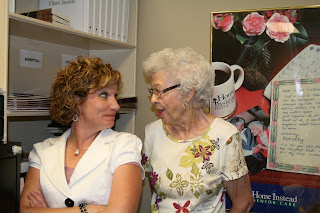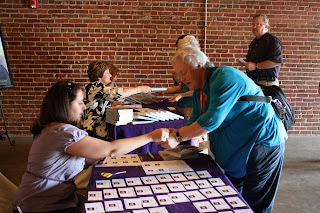Home Instead Senior Care hosted a book tour event to educate individuals about "Stages of Senior Care", written by Paul & Logan Hogan, founders of Home Instead Senior Care.
The day started with a visit from Paul Hogan and other Home Instead staff from Omaha. There was a request for some Dreamland BBQ so we brought it in for lunch.
Thank goodness for bibs since ribs are not the smartest thing to eat right before an event!
Paul agreed that the bib was a good idea!
The Birmingham office enjoyed the ribs & BBQ too - especially the banana pudding!
Dan's mom filling Holly {our performance coach from Omaha} in on Dan stories.
Dan & Paul before the event
After a great lunch we closed the office and headed to the B & A Warehouse to set up. Andrea Martin, our Assistant Operations Manager, worked closely with the B & A to ensure a great event.
Andrea surprised us with her flower arrangement ability!
Registration
Networking
Paul with Vance Holder & Sharon Ziemack
Jack Carney with Montgomery Home Instead owner Bill Purnell
Dr. Richard Allman greeted by Dan & Paul.
After about an hour of networking Paul began his presentation.
Paul explained who inspired him to start Home Instead Senior Care - Grandma Manhart.
15 years later and 40 million hours of care in 15 countries, Home Instead began to see trends effecting seniors. This trend was a lack of education and planning for their care.
Three challenges facing seniors and their adult children:
- First, they just don’t know about the care options or the cost of that care.
- Second, they don’t know who pays for what.
- And, finally, planning for senior care just isn’t a priority for them.
This lack of awareness and planning puts this generation at risk. This is why Paul and Lori wrote Stages of Senior Care.
Next, Paul shared with us what was learned about seniors and their loved ones when it comes to planning for care.
When asked in a survey to name unaided senior care options, here is what we learned:
- 71 percent of adult children could name only two senior care options;
- Seniors did even worse, with only two-thirds being able to name two care options;
- And, the two most cited care options were skilled nursing homes and assisted living centers – no surprise.
Most seniors and adult children STILL think Social Security, Medicare or their parents’ retirement accounts will cover the cost of care.
Also, in terms of assets available to pay for care, here are the facts:
- Two-thirds of seniors have assets valued at less than $75,000
- 41 percent have assets of less than $20,000.
- 75 percent of seniors have annual incomes of $36,000 or less
- 40 percent have annual incomes below $12,000
73% of adult children have neither planned nor thought about care.
Only 1/2 of seniors have planned or thought about developing a care plan for themselves.
Basically what we have found out about seniors and adult children:
- They do not understand senior care options.
- They don’t have a realistic grasp of the costs.
- They’re making a dangerously wrong assumption that government programs will pay for their care.
- Seniors are in no position to fund their own care.
- They have not planned for senior care.
YIKES!
Stages of Senior Care addresses all of these issues and more.
There used to be only 3 options for seniors.
- Stay in their own home
- Move to your home
- Move to a nursing home
Now there are more options for seniors - what many call the Continuum of Care:
- Aging in place
- Family care
- Senior centers & adult care centers
- Nonmedical care at home
- Medical care at home
- Retirement & independent living communities
- Assisted living
- Skilled nursing home
Paul also discussed resources to help you in the discussion of planning for care. We have a great website - 4070talk.com to help with this.
Ten Signs of trouble - recognizing when help is needed:
- Household bills piling up
- Reluctance to leave home
- Losing interest in meals
- Declining personal hygiene
- Declining driving skills
- Scorched pots and pans
- Signs of depression
- Missed doctors’ appointments and social engagements
- Unkempt house
- Losing track of medications
As you can see Stages of Senior Care is a great resource.
If you were unable to attend our event we have great handouts we can send you.
Please call us at 822.1915 or visit our website at www.homeinstead.com/bham


















0 comments:
Post a Comment